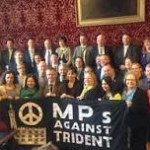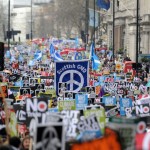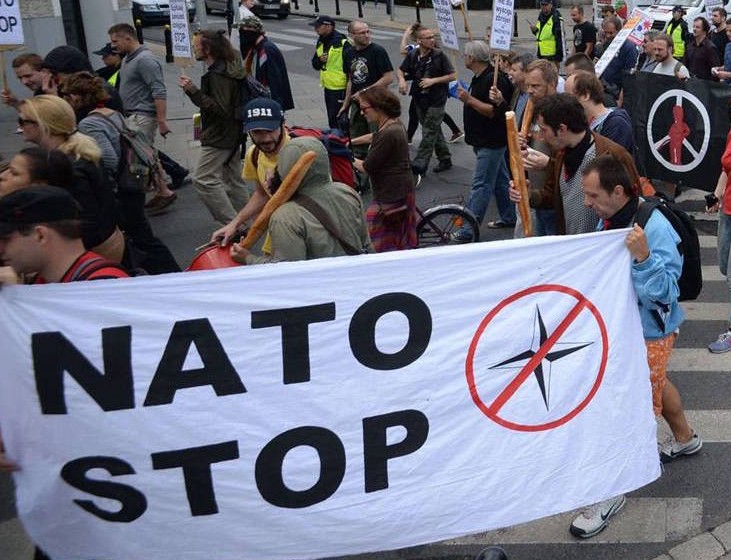THE NATO SUMMIT IN WARSAW: War hysteria against Russia. No other Nato Summit ever met so close to the Russian border; quite in keeping with the huge military, financial and political means that Nato brings together to provoke Russia. In only a few years, Russia’s status passed from ‘partner’ (when the Warsaw Pact was being dissolved and the USSR was being dismantled) over to main adversary of the 28 Nato member States, if not quite yet their outright enemy.
At this Summit, the 28 participating heads of government, and all their ‘guests’, came to justify and speed up their move towards open war. Still talking of “self defence” and “overall security” they pooled together their most offensive military arsenals. One of those arsenals is their nuclear-capable anti-missile ‘shield’. It covers the Baltic countries and Rumania, and all the way to the Black Sea.
Nato’s nuclear strategy enshrines its “right to the first strike”. Its armies are to be modernised and reorganised in accord with “Nato’s specifications”. In all the countries across the way from Russia, massive manoeuvres and military exercises are planned by land, air and sea. Although not yet Nato members, Georgia and Ukraine attended the Summit, with president Poroshenko (of Ukraine) as guest. Montenegro is soon to be Nato’s newest member, never mind the massive opposition of its population.
Number One Nato servant is Poland. Its political leaders rejoice in the thought that this Summit takes place on the spot where the Warsaw Pact was signed; they relish the idea of Nato’s troops massing now where those of the Warsaw Pact once stood, in Soviet times. And they are proud also of assigning many Polish soldiers to the permanent battalions that Nato puts in place in all the countries of Eastern Europe.
Such developments do not stop at Poland. In almost all the countries of Eastern Europe that used to belong to the USSR or to the Warsaw Pact, the most right wing and anti-communist parties have laid hold of governments. First they dislodged the disenchanted Social Democrats and Christian Democrats of “the third road”; and then, not interested in even a minimum of neutrality, they sold themselves to Nato.
There is really nothing of the protecting umbrella about Nato: it is the military instrument for the defence of the big capitalists’ interests, of the US as much as of Europe, whether in the European Union or outside of it. Since 1989 and the fall of the Berlin Wall, East Germany was absorbed by West Germany; the USSR was dismantled, and the Western capitalists worked to grab back the Eastern Workers States, and Russia. They gained partial success by imposing the capitalist market on statised and planned economies, and by using the dream of the old, corrupt and parasitic bureaucracies to become a bourgeois class.

Due to their own crisis, the world’s capitalists failed to grant even a little space to this competition. In Russia, they only managed to buy off the small sector of ‘oligarchs’ willing to re-sell (to the US and European capital) the vital economic resources previously privatised by the Yeltsin bureaucracy; that was when Nato had offered to Russia “a partnership for peace” in hope of subsuming Russia under the banner of the big world “struggle against terrorism”.
Today, medias and politicians talk of a “Return to the Cold War”; but this is because not all aspects of the socialist system have disappeared from the old Soviet Union and the ex ‘socialist countries’ of Eastern Europe Indeed they are regaining much strength. There is also the fact that capitalism cannot change its nature; it cannot supersede private property, the race for profits, power ambitions, competition and all its contradictions. It cannot even put up with the rivalry of competitors like these oligarchs of Russia & Eastern Europe, let alone the competition of the so-called emerging countries like China (and the ‘Brics’[1]). And what it cannot stand at all, is the rebellion of the masses in all of these countries.
From ‘partnership’ to armed confrontation:
Nato presents its participation in the State coup in Ukraine as an act of legitimate defence against Russian aggression. But its participation in that coup contributed to the creation of the Poroshenko government, and this is how the European Nato leaders can now say that they want Ukraine inside Nato.
It is systematically that the Western medias hide Nato’s crucial role in the civil war in Ukraine. This is why they blame “Russia’s annexation of Crimea” and ignore completely the overwhelming determination of the people of Crimea to win their return to Russia. The Western medias present the rebellion of the masses in the Donbas region (and the birth of the Donbas Republic) as pure Russian manipulation.
Around this particular Nato Summit, some differences have appeared between the Nato member States as to what to do about Russia; but they all caved-in, in the end, and accepted what amounts to clear war preparations against Russia.

Stop Trident protest, 27.1.2016 London, called by Campaign for Nuclear Disarmament, CND.
The European Union-Nato relations:
In the UK referendum, the narrow Brexit victory does not necessarily pose problems to Nato. The very substantial military contribution of the UK to Nato is not about to lessen, particularly in the matter of the UK’s atomic submarine Trident. What Brexit is a debacle for, however, is any remaining hope to build the “European Pillar” of Nato[2]. Such ideas had existed in the past, in Social Democratic parties and Euro-communists.
All this has gone. Now, the European Union is led politically by right wingers and centrists. This was expressed in this Summit by Federica Mogherini, head of EU diplomacy[3]. Speaking for the European Union, she dismissed the thought of any “European autonomy” within Nato, and outlined the new Nato “Global Strategy” instead. In the matters of security and defence, the idea is to drop anything ‘autonomous’, and draw the European Union and Nato ever closer together.
Some heads of States, like Francois Hollande, hinted at the need “to discuss with Russia”, but this was followed by no action plans. What all those heads of States agreed instead, concretely, is to crank up the pressure on Russia and proceed with the military installations that tighten Russia’s encirclement. The list of the States committing soldiers to permanent Nato’s battalions in the Baltic and Poland is significant: Germany, Canada, UK, US, Holland, Germany, Canada, Denmark, Italy, Norway, Turkey, Spain.
Nato reasserts its world gendarme ambitions:
At this Summit, many heads of States, or representatives, were not from European countries. They were not from the European Union or candidates to become part of it. Such was the case for Afghanistan and Jordan, and other countries involved in coalitions said to be fighting Daesh. Israel, Saudi Arabia and the Emirates were not far behind, since they have just set-up permanent representations and offices right inside the Nato headquarters in Brussels.
Les Posadistes, 9.7.2016
The featured image is from the counter-Summit demonstration in Warsaw, 9.7.16
[1] In economics, Brics is the acronym for a grouping of countries: Brazil, Russia, India, China, South Africa.
[2] There was a time when less reactionary socialist, Christian-democratic and liberal-bourgeois sectors had envisaged the creation of a military and security policy specific to the European Union – France and the UK accounting for 50% of the European Union’s capacity to intervene militarily and autonomously in the world. This had suggested the possibility of the construction of a “European Pillar” of Nato. In practice however, the UK always inclined towards Nato rather than towards a European Pillar.
[3] Federica Mogherini heads the EEAS, European External Action Service. At the ceremony in Warsaw, she joined the other EU leaders and Nato Gen. Sec. Jens Stoltenberg.
















